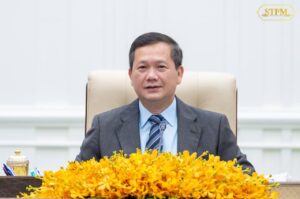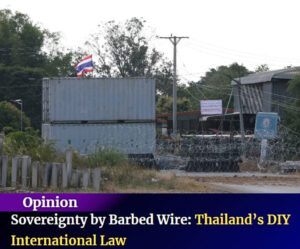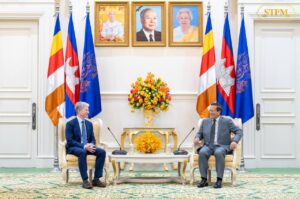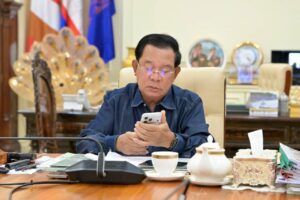(Video) Selected Comments of Samdech Thipadei Hun Manet, at the official inauguration of the academic, administrative, dormitory and experimental buildings and achievements in Ratanakiri Province [Unofficial translation]
[1]
(1) Ratanakiri had so much difficulties during the war and animosity period
Let me thank HE Nhem Sam Oeun, Governor of Ratanakiri Province, for the report that the female and male citizens in the province have reached almost equal number […] I am happy to be back in Ratanakiri Province. This is the first time since I took up my new position, but I had been here many times when I was in the army and relating to the youth work. I have observed some remarkable changes, especially the recent development in Ban Lung town, […] today, I am inaugurating schools, administrative buildings, dormitories and experimental buildings in Ratanakiri province […] throughout the province […] my congratulation on the new achievements for our citizens and teachers. This is an important principle for the development of the country […] We cannot develop only big cities and towns. Ratanakiri is one of the most remote provinces […] Our people here know that we have a long and rich history. During the period of war and the period when there was no national unity, before we ended the war and animosity by the win-win policy in 1998, there were difficulties […]
(2) Develop country, provinces, cities, and districts under the shadow of peace
As of now, traveling to Phnom Penh (from Ratanakiri takes) four or five hours by car. If we drive slowly, it would take seven to eight hours. In the past, in absence of connectivity, to get to Phnom Penh, traveling would take two nights and three days, and in some places, should you want to go faster, you had to go into Vietnam and back to Bavet (at Svay Rieng) […] if we compare those difficulties to what we had been through, when His Excellency Nhem Sam Oeun read from the beginning, the words “we thank peace, win-win politics, and development in the shadow of peace” mean a lot to Ratanakiri province. Those of you who were born after the war may not understand […] Even those who came to the region in the early 2000s could understand how difficult it was […] If we maintain peace and continue this kind of development for another 10-20 years, the next generation of children will be better off. This is the goal of developing the country, provinces, cities, and districts under the shadow of peace, so that the county will always be moving forward […]
(3) Immediately after the war, Samdech Techo prepared a plan for the development of the provinces in the northeast
I would like to thank the previous governments led by Samdech Techo and the leadership of the Cambodian People’s Party, as well as the previous provincial governors who worked hard to build the country from time of difficulties […] Immediately after the war, Samdech Techo prepared a plan to push forward the development of the provinces in the northeast quickly to close the gap in the country’s development […] In the CLV-DTA policy, which the other day there was a protest against it […] organized development projects for the triangle area, where the poorest regions in the three countries come together to (benefit from them) […] and mobilized assistance to organize and support from the friendly countries like Japan, the World Bank, and many international organizations […]
(4) Since 2004, the northeast provinces have become more prosperous and connected to the nation
The Japanese leadership met me asking about us withdrawing from the project […] as they have seen that we had in fact achieved one step towards the development goal already […] Those who were involved in helping to organize that project at the Japanese Ministry of Foreign Affairs told me that this project was very good. They reaffirmed “it is not a Japanese project to make Cambodia, Laos, and Vietnam lose their sovereignty or create a region for someone to monopolize and create a mess” […] We explained them our position and thank them for their effort. We told them that we now have the ability to do it ourselves internally. People across the country have also understood that since 2004, when we implemented the project, there has been no loss of land, no people (from) other countries coming over to stay. On the contrary, the people of Ratanakiri, Mondulkiri, Stung Treng, and Kratie provinces have become more prosperous and more connected to the nation […]
(5) Promote development and abandon no bilateral and trilateral relations with neighboring countries
Today, you are wearing traditional indigenous clothing. The rights and freedoms of indigenous people are protected […] We think together about development. We protect the cultural traditions of our ethnic groups. We prepare land policy programs, protect ethnic minority communities, and provide opportunities for everyone. There is no discrimination in development […] After withdrawing from the CLV-DTA, the Royal Government has continued to promote the development of the country. We do not abandon bilateral and trilateral relations with neighboring countries […]
(6) People living along with neighboring countries is a policy to develop and protect territory along the border
Some people want us to build fences. There is no need to build fences to prohibit countries from doing anything. Fences cannot keep people out. On the contrary, development along the border, developing border provinces is the best strategy to protect territorial integrity in the long term. We create condition for people to move in and development there. They will be land guards, rather than deploying troops to guard the land […] Having relations with neighboring countries, people living along the borders of neighboring countries, respecting each other, helping each other, and having good cooperation is a policy to develop and protect our territory along the border […]
(7) With economic growth, the population will grow faster leading to increasing development
According to the report of the Provincial Governor, (the female and male ratio is somewhere between) 49% and 51% […] the Ratanakiri people are encouraged to have more children […] The topic of encouraging more children seems to be of interest to you, because now I think the speed is also increasing […] If there is economic growth here, the population will grow faster because there will be people living in other provinces who want to come to find job opportunities, more development opportunities, to do business, to earn a living, and to find work here, so the growth will increase even more. I believe that the Ratanakiri people will not mind more Khmer people coming from other provinces to do business, to work for Ratanakiri province. They are not here to take away land and jobs, but to increase your economic strength, to help increase development, for example, to invest in natural tourism, to create a resort, to attract tourists, and the benefits will come to people who have their goods to sell, etc. […]
(8) Ratanakiri has got lots of potential in agroindustry, nature tourism, and agriculture
I thank everyone concerned for organizing and improving public spaces in provincial capitals […] When thinking about tourism, don’t just think about those who come from afar, but think about those in the (location) as well. Firstly, locally, in the city, in the province itself. Let us create more entertainment venues, places for sports, places where you can bring your children to have fun on weekends. Don’t just think about developing for tourists from Europe, etc., think about the local tourists, which is also now in the millions. We organize these products to complement each other […] Ratanakiri has a lot of potential in agroindustry, nature tourism, and agriculture. We must draw on all these potentials, making them beneficial to the community […] If there is investment from abroad, please don’t kill the local economy, but to boost the local economy, which is called sharing life, increasing the potential that our ancestors/nature have left for millions of years, such as Lake Yeak Loam, etc. […]
(9) The development policy of Ratanakiri is to give the people the ability to create and take up jobs based on knowledge and skills
In terms of building human resources, focusing on building schools, teachers, and the education system, where we have a shortage that needs to be filled step by step, ensuring both quantity and quality. When it comes to education, we must focus not only on quantity, but also on quality. Therefore, the Ministry of Education (Youth and Sports) has been working hard for decades to strengthen teacher qualifications and organize various incentives. It is believed that in remote provinces, the supply of teachers, to match the rapid population growth even when the country is connected, the roads are connected, and the economy is connected, has not been easy. It has been a subject that we must face and solve more effectively […] Wherever it may be, people need education and training. The development policy of Ratanakiri province is to give the people of Ratanakiri the ability to take up jobs, create jobs, or create more achievements of their own, based on their abilities, knowledge in school, or skills through various vocational training […]
(10) Analyzing the possibility of increasing the budget from next year onwards to expand more secondary schools and high schools
Samdech Techo and the Royal Government from previous mandates have pushed primary schools, kindergartens, especially primary schools, secondary schools, and high schools to the grassroots level. I am analyzing the possibility of increasing the budget from next year onwards to expand secondary schools and high schools more, because there is still a big gap between the number of primary schools, secondary schools, and high schools. We have more than 7,000 primary schools, but only 1,000 to 2,000 secondary schools, and only more than 1,000 high schools. Therefore, we must accelerate the absorption of people from primary schools, combining them with secondary schools and high schools, plus vocational training programs, so that the people can become long-term capital. […]
(11) Allocate more in the national budget to education and health to help people achieve good health, knowledge and skills to help the country
Our long-term assets are these human resources. The Royal Government promotes the creation of additional funds, as well as the national budget, to allocate a lot to education and health. Good health, knowledge, and skills, and abilities can help the country a lot […] If we did not have the human resources that have built, maybe there would not be so many schools. That we have this many schools, but we have not trained enough teachers in our country, maybe we would have to bring teachers from Phnom Penh or from abroad to work here. That would not be a feasible option. Once we are expanding schools, we have to increase the number of teachers. And, to increase the number of teachers, we have got to have training expanded from the bottom level […]
(12) Without CLV-DTA, strengthening own capabilities, using potential of human and natural resources, and funds to create additional energy for the province
(Ratanakiri has striven) from being a remote province with almost nothing 20 years ago to becoming a province with the characteristics and a reasonable development base to have main basis to maintain peace, national unity, and social stability in the province […] Please continue to have confidence in the Royal Government, led by the Cambodian People’s Party, and in the policy of helping build and develop, whether Cambodian citizens or indigenous people. We cooperate to develop […] to complement the policies from the center to the four northeastern provinces […] Even without the CLV-DTA […] we have been now living by ourselves, ding things by ourselves […] strengthening our own capabilities, using all the potential of human resources, natural resources, and the funds we have, being creative to draw and create additional energy for the province, because the northeastern provinces are the important pole to compare, compete, and connect with other poles so that there is no gap […]
(13) Provide northeastern students with opportunities, schools, roads, computers and electricity and internet access just like everyone else
In Ratanakiri province, there are two model schools and four more schools that have participated in the 2024 model education service unit competition. (It depends on) the opportunity (because) brainpower is not inferior to each other. The Ratanakiri students are not inferior to those in Phnom Penh, as long as we provide them with opportunities, connect them with schools, roads, provide them with computers and electricity, internet access, and do research, just like everyone else […] That would help build them self-confidence. Help them take the opportunity to maximize potential […]
Peace is here, and we must work hard to take advantage of potential places. Where there are mines, demine them. Where there is land conflict, there is no clear resolution in land ownership, we start measuring land, distribute ownership to them. Places that have the potential to create jobs, attract investment, or we create investment in the province to provide services. We are together at the national and sub-national level, the Royal Government and the people must be united. The Royal Government creates characteristics, provides rights, freedoms, provides finance, provides policy principles, and guidance […]
[2]
(14) If your people are healthy, care for the environment, love cleanliness, practice hygiene, and leave no garbage, then the city is clean
Ensuring human ability is to consider both quality and quantity. The province has few people, so the human resources that are available must be real. This means that if there are ten staff, all 10 are strong or at least nine are strong. If there are ten staff, but only four are up to the tasks expected, and the remaining six are incompetent, we will lose to a province with five staff, and all five are fully competent […] this is not only in terms of knowledge, but also in terms of attitude and morality […] Let’s pay attention to moral education, good manners, and behavior. And it is necessary for teachers and parents to cooperate (to help train). There are three types of training locations – at home, at school, and in the surrounding environment in society.
We cannot blame society for the child’s incompetency and/or bad actions. What is this society born of? It is born of people. A certain way that a family behave, that would be how the society is doing […] If your people are healthy, care for the environment, love cleanliness, hygiene, and leave no garbage, then this city is clean […] It would not be because of the living conditions, but because of the behavior and mindset of training […] When living conditions improve, behavior changes, and most of the behavior becomes more difficult. When you are poor, you tend to respect each other, love each other. Once people are better off, they start competing with each other, thinking about (wanting to win), stop respecting each other, and stop valuing each other […]
(15) A good school and good students start with teachers and the school board
This mutual respect training guarantees a long-term prospect […] The Ministry of Education (Youth and Sports) has been pushing for many years on the standards of teachers, of model schools, and governance, starting with teachers. A good school, good students, starts with teachers, from the school governing board. If you want students to be disciplined and on time, teachers must be on time. If you want the school to be clean, students to be hygienic, and pick up trash, only the principal and teachers can enforce this, see where the trash is, and start cleaning it […] The quality of education does not depend on grades alone.
For the same lessons, the schools are in proximity in the same city, why does this school have more students (passing exams) than in the other school? Sometimes it depends on discipline, where students are disciplined in learning, with teachers who work hard to pay attention (teaching) […] Our parents would raise us until we are 17-18 years old, finish school and go to work for ourselves. When it’s time to have a husband, wife, and children, we have to support them […] Our ability to study until we finish helps us to be able to find a job and be able to raise our children better […] Please don’t waste time, and use your phone more for research […]
(16) “Without knowledge, no one would give a chance to lead”
Every day, I am still learning, even as the Prime Minister. I don’t know enough. Even when I came here, I studied the case of Singapore and Malaysia fighting at the ICJ over the border. I am preparing to fight the border at the ICJ too. We are studying and researching the experiences of other countries to find ways to resolve the conflict […] In about 20 to 30 years, people my age will be about 70 years old […] Those of you who are now 17 or 18 years old, in 20 years, will be 37 or 38 years old, and all of you are full of energy […] The fact that there was that day that there is today. There is an opportunity to lead others in the future, until we are able to learn from today. If we don’t have the knowledge in ourselves, no one would give you a chance to lead […] Every year goes by quickly, every day goes by without you noticing it […] (time) flies […]
[3]
(17) Cambodia’s three pronged-approach told to the ASEAN rotating chairperson
Let me open rackets here […] regarding the relationship, as well as the Thai people, where we are facing a difficult subject, requiring a balanced solution. One wrong step can cause serious problems, taking one wrong move, we would not accomplish the task and make the problem more complicated.
Yesterday, Prime Minister of Malaysia HE Anwar Ibrahim, who is the rotating chairman of ASEAN, called […] asking about the situation and position of Cambodia on the Cambodia-Thailand border issue that occurred last week […] I told him the Cambodian position as I have said publicly, which is that Cambodia uses a three-pronged approach:
Firstly, Cambodia uses technical mechanisms, which is to try to resolve the issue through the border commission of the two countries, using legal documents, maps that have been agreed upon […] There is a MoU 2000, a 1907 French-Siamese border commission map, and a 1904 map with a (scale) of 1/200,000 for the 800-kilometer border line from Mom Bei to Koh Kong province […]
Secondly, if this (bilateral) mechanism is not possible, we use international mechanisms […] like at the Cambodia-Laos border, we use third parties […] We rely on France to help us print maps […] The other day, some politicians abroad asked, “why haven’t we resolved this issue long ago?” Why is Samdech Techo bringing up the border issue to resolve it now? I asked, as a political leader, do we want to stay silent and let the Khmer people fight forever? If the bilateral solution doesn’t work, we can go to international mechanisms to resolve it […]
Thirdly, in case of necessity, if there is an invasion of our territory (by) force, we will also use force (to respond). But this third step is of no benefit to any country […]
(18) Cambodia’s four positions emphasized to the ASEAN rotating chairperson
I assured His Excellency Anwar that Cambodia adheres to four positions. Firstly, it has always maintained its position of maintaining peace, friendship and good cooperation with Thailand and neighboring countries […] Do not let a small issue spread throughout the country […] I appeal to our citizens throughout the country to prevent the issue of resolving these border points from spreading to the point of becoming an ethnic conflict […] Please remain calm and quiet, trust the Royal Government in using technical mechanisms, international legal mechanisms and, if necessary, to protect territorial integrity, using the mechanisms of our armed forces to protect territorial integrity […]
The second position is that Cambodia has decided to take the issues of Ta Moan Thom Temple, Ta Moan Toch Temple, Ta Krabey Temple and the Mom Bei area to the International Court of Justice (ICJ) to find a peaceful solution to the border issues in these areas quickly and permanently, rather than leaving behind chronic problems that can cause border conflicts […]
Thirdly, we will continue to cooperate with the Thai side to continue measuring the remaining border demarcation lines between the two countries, in addition to the four points that we have taken to the ICJ, using the bilateral mechanism between the Cambodia-Thailand Joint Boundary Commission (JBC). We will not abandon the bilateral mechanism […]
Fourthly, continue communication with all parties. I told His Excellency Anwar that these four principles are the approach taken by the Royal Government. We do not want to leave the remaining issues from hundreds of years in limbo, with the risk of conflict for years. We want to resolve them peacefully, relying on law and technology, rather than creating hostility between us […]
Hopefully, at the meeting on June 14, we will find common ground to continue the negotiation process to resolve the remaining border issues of hundreds of kilometers. Although Cambodia has taken these four points to the ICJ, there are many other points where we need to continue the border demarcation lines through bilateral mechanisms, based on the MoU 2000, based on the map that we have agreed upon. Hopefully, through these mechanisms, we will continue to move forward in resolving border issues, especially land borders, as soon as possible, and maintain solidarity between countries and people and people in all sectors […]./.






